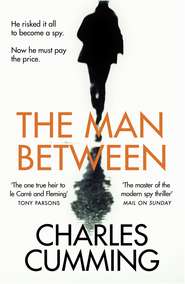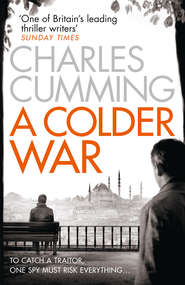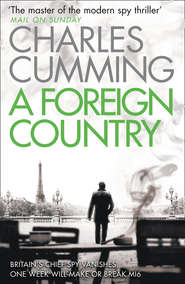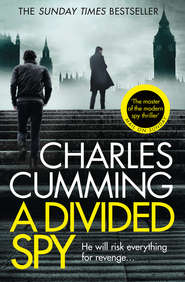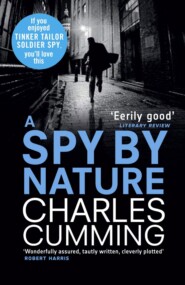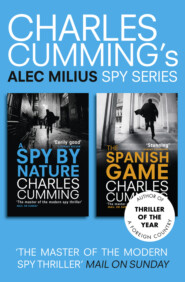По всем вопросам обращайтесь на: info@litportal.ru
(©) 2003-2024.
✖
The Trinity Six
Автор
Год написания книги
2018
Настройки чтения
Размер шрифта
Высота строк
Поля
Tanya felt a lurch of shock which quickly warped into a feeling of profound satisfaction. How many people knew what she had just been told? The identity of the sixth man was the most carefully guarded secret of the Cold War.
‘Crane’s operational codename was ATTILA. He’s managed to remain anonymous, largely because we’ve managed to keep people off his scent and largely because there was no record of ATTILA’s activities in Mitrokhin.’ Tanya had a sense, even as Brennan was talking to her, that he was holding back a vital piece of information. ‘The finger was pointed at Victor Rothschild, the finger was pointed at Tom Driberg. Christ, at one point they even suspected Roger bloody Hollis. But nobody has ever identified Crane. Until now.’ Brennan pivoted away towards a broad, sunless window in the north corner of the office. ‘Doctor Gaddis is on the trail of a gentleman by the name of Thomas Neame, a ninety-one-year-old currently resident at a nursing home near Winchester. Neame, for reasons that I am not yet in a position to divulge, knows more or less all there is to know about Crane’s work for the Russians. I’ve put some basic information in this file.’ He passed a slim manila envelope to Acocella, which she secured in her lap. ‘It goes without saying that this is a sealed operation. You will report solely and directly to me. I have given you the name of an officer at GCHQ Cheltenham who will assist you with any communications information you may require.’ Both of them took a beat to absorb the euphemism. ‘I don’t have the manpower to spare on surveillance, so you’ll be operating alone unless there are exceptional circumstances. Any questions?’
Tanya was experienced enough to send that one back over the net. It was better to say: ‘I think perhaps I should read the file first, sir,’ so that Brennan could be assured of her professionalism.
‘Good.’ He seemed pleased. ‘Have a look at it, come up with a plan of attack.’
She stood up, the file under her arm. ‘There was just one thing, sir.’
Brennan was planning to open the door for her, but stopped mid-carpet. ‘Yes?’
‘What did you mean when you referred to status, to sex, to the lust for money? Are you implying that these are particular weaknesses in the Gaddis character?’
Brennan reached for the door handle. ‘Well, who knows?’ he said. ‘That will be for you to find out.’
Chapter 12
Some things are so obvious that they can embarrass you with their simplicity.
Gaddis had been working at home over the weekend – preparing a lecture for the new term at UCL, fixing a leaking pipe in his leaking bathroom – when he needed to boot up an old laptop in his office in order to find an email sent to him by a colleague several years earlier. As he was scrolling through the cluttered inbox, he saw a cluster of emails sent to him by Charlotte from a hotmail address that Paul had known nothing about: bergotte965@hotmail. com. Charlotte had set up the account during a difficult period in her marriage in order to communicate privately with three of her closest friends, Gaddis among them. It was a eureka moment, a solution that had been staring him in the face. More than a week had passed since Gaddis had spent the fruitless day in Hampstead searching through Charlotte’s office. It had never occurred to him that she might have used the hotmail to communicate with Thomas Neame.
He needed a password, of course, but that was easy. Gaddis simply had to type Charlotte’s mother’s maiden name into a security check, give her date of birth, and the details were forwarded instantly to her Outlook inbox. Gaddis could access this via webmail and within five minutes was staring at the messages.
It was like a sequence of lights illuminating a darkened highway. Before his eyes was a list of every main player in the St Mary’s cover-up. There were emails from Benedict Meisner, messages with the subject heading ‘Lucy Forman’, as well as frequent exchanges with Calvin Somers. Gaddis had surely stumbled upon the key which would unlock the door of Charlotte’s research. It was all here, everything he would need to find Neame.
He began with the Meisner correspondence, but quickly realized that it was a legal and factual dead end. Now working as a homeopathic doctor in Berlin, Meisner denied ever having met Calvin Somers or playing any role in faking the death of Edward Crane.
As I have repeatedly pointed out to you, any suggestion that I was involved in gross professional misconduct of the sort you describe is as absurd as it is defamatory. Should you continue to pursue this matter, I would have no hesitation in instructing my lawyers to instigate proceedings against you, and against any newspaper or publication which chooses to publish these bizarre allegations.
Gaddis turned to the message with the subject heading ‘Lucy Forman’. The email was from Forman’s sister. It transpired that Forman had died in a car accident in December 2001. In a second email, the sister confirmed that Forman had indeed been working in London in February 1992, the winter of Crane’s supposed death.
As Gaddis was finishing Charlotte’s correspondence with Somers – most of which related to arrangements for various meetings in West Hyde and Chorleywood – he noticed a new message in the Hotmail inbox, addressed to bergotte965@hot mail.com from ‘Tom Gandalf’ with the subject heading ‘Wednesday’. It could have been spam, but he clicked it.
tomgandalf@hushmail.com has sent you a secure email using Hushmail. To read it please visit the following web page …
A weblink was listed below. For a moment, Gaddis was concerned that it would download a virus into his computer. But the coincidence of the Christian name ‘Tom’, added to the clandestine nature of the message, convinced him that the email had originated with Neame. He clicked the link and was taken to the website for an email encryption service.
Your message has been protected using a question and answer which was created by the sender. You must correctly answer this question, word for word, to retrieve your message. You will be limited to five incorrect responses.
Question: Who was in the photograph that I showed you at our last meeting?
Gaddis typed ‘Crane’, then ‘Edward Crane’ into the response box, but his guesses were rejected. What had Neame shown Charlotte? A photograph of Sir John Brennan? A picture of Maclean or Philby? Christ, for all he knew, it could have been a shot of the Loch Ness Monster swimming to Fort William and clambering up Ben Nevis before breakfast. Without an answer to the question, he was no closer to Neame, no closer to Crane. All of his initial enthusiasm over the hotmail account had evaporated inside an hour: Forman was dead, Somers had spilled his guts and Meisner would doubtless slam the door in his face if he hopped on a plane to Berlin.
It was square one again. Gaddis Redux. Charlotte had been carrying around the entire story in her head. He looked at his desk, where he had scribbled down the cost of a cheap flight to Sheremetyevo on the back of a bank statement. His only hope now was a miracle in Moscow.
Chapter 13
Miracles come in many different guises. This one came late on Sunday night, while Holly Levette was cooking supper at her flat in Tite Street. Gaddis was lying back on the sofa, reading the papers and drinking a glass of red wine. Holly’s laptop was open on a low table in front of him and he called out to her in the kitchen.
‘Mind if I check my emails?’
‘Be my guest.’
Glass of wine in hand, Gaddis logged into his UCL account and clicked through his messages. There was one from Natasha in Spain, another from a colleague in Washington, and a round robin from a distant relative in Virginia trying to persuade friends and family to buy the paperback of his latest book. Gaddis checked the Spam folder – ‘Be a Master of the Universe with a Huge Broadsword in your Pants’ – and within the mass of junk offering him tertiary education courses and Viagra, he spotted a message that he could scarcely believe:
tomgandalf@hushmail.com has sent you a secure email using Hushmail. To read it please visit the following web page
The same weblink that he had seen on Charlotte’s Hotmail account was listed below. Gaddis looked up at the kitchen door, expecting Holly to walk into the room with two steaming bowls of spaghetti. He clicked the link and was again taken to the Hushmail website:
Your message has been protected using a question and answer which was created by the sender. You must correctly answer this question, word for word, to retrieve your message. You will be limited to five incorrect responses.
Question: Who was the doctor at St Mary’s Hospital, Paddington, in 1992?
Gaddis quickly typed in the answer.
Benedict Meisner
It was wrong. He had only four responses left.
He tried ‘Ben Meisner’ and swore when the answer was again rejected. Third time lucky, gulping wine, Gaddis typed in ‘Dr Benedict Meisner’, whispering ‘Come on, come on’ under his breath as he hit ‘Return’.
Like the click of a lock on a safe, the door swinging open, he was taken to a private message:
Dear Dr Gaddis
I knew Eddie Crane very well. Indeed, he was my closest friend for more than fifty years. For reasons that will become obvious to you, this is not the sort of information that I tend to make public.
If you would like to contact me, I suggest that you present yourself at the branch of Waterstone’s bookshop in Winchester High Street at 11 a.m. on Monday. If this is inconvenient for you, do not reply to this email directly. Instead, please send a blank email with the subject heading ‘Book’ to the following address: parrot1684@mac.com If you are able to make the journey to Winchester, please carry a copy of the International Herald Tribune with you and, having entered the bookshop, make your way upstairs. This is so that I might more easily recognize you. Eddie taught me a trick or two about tradecraft.
Sincerely,
Thomas Neame
Gaddis was flabbergasted. How did Neame know that he was investigating Crane’s death? Holly called out ‘Food’s ready!’ and her voice made him lurch half out of his seat in surprise. He quickly scanned the text a second time. He was aware that he should probably remove evidence of the correspondence from her computer, yet Gaddis had no idea how to clear the history quickly from an Internet browser.
He heard the strike of a match in the kitchen. Holly was lighting candles. Unsure of what to do, he simply signed out of his email account and shut off the computer. Holly put her head round the door just as he was closing the lid.
‘I was planning to eat the spaghetti tonight,’ she said.
‘Sure.’ Gaddis stood up. He had a head full of questions and an empty glass in his hand. ‘What do you know about Winchester?’
Chapter 14
Winchester was just as Holly had described: a well-scrubbed, moneyed cathedral city an hour south of London with a clogged-up one-way system and memorials, seemingly at every corner, of Alfred the Great.
Gaddis arrived an hour early. He had not slept well and left Holly’s flat at eight o’clock for fear of being stuck in traffic or, worse, of his superannuated Volkswagen Golf breaking down on the M3. He bought a copy of the Herald Tribune on the Fulham Road, knowing that it would be difficult to find one at any newsagent in Winchester, and drove, too fast, with a take-away cappuccino wedged between his legs and Blonde on Blonde on the CD player. In Winchester he ate a breakfast of scrambled eggs at a faux-French café in the centre of town, having established that Waterstone’s was not yet open. He had the latest issue of Private Eye and a photocopied Prospect article about Moscow to read, but found that he could concentrate on neither. The Herald Tribune lay untouched in a leather satchel at his feet. His waitress, a bottle-blonde Hungarian, was pretty and bored, stopping to chat to him in fractured English about a course she was taking in design and technology. Gaddis was grateful for the distraction.
At half-past ten, the morning moving with a tectonic slowness, he made his way to the entrance of the bookshop, drifting about on the ground floor with no discernible purpose other than to look up at every customer who walked through the entrance, hoping to see a ninety-one-year-old man. By force of habit, he searched for traces of his own work and found a single hardback copy of Tsars, nestled alphabetically in the History section. Ordinarily, Gaddis would have introduced himself to a member of staff and offered to sign it, but it seemed important to maintain a degree of anonymity.






